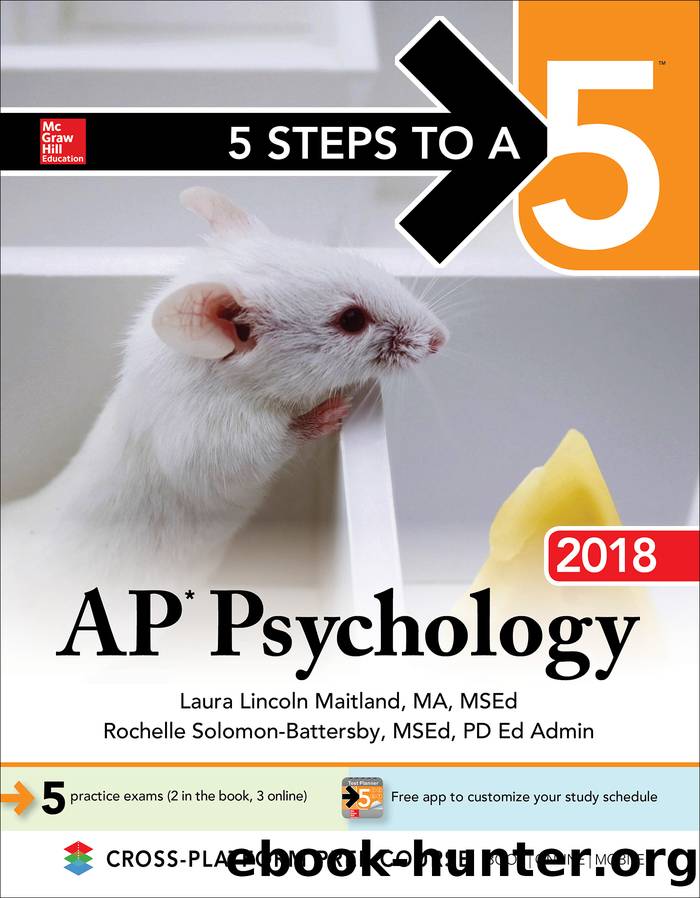5 Steps to a 5 AP Psychology 2018 edition by Laura Lincoln Maitland

Author:Laura Lincoln Maitland
Language: eng
Format: epub
Publisher: McGraw Hill LLC
Published: 2017-12-15T00:00:00+00:00
Answers and Explanations
1. DâSecurely attached kids tend to come to their mother for comfort when their mothers return. They are not necessarily clingy as choice C suggests.
2. AâNature refers to our heredity, and nurture refers to environmental factors.
3. CâLongitudinal research. If an experimenter is interested in looking at the long-term effects of divorce on children like Mavis Hetherington did, follow-up visits and observations would be made periodically. The disadvantage of this research method is how costly it is to conduct these follow-up visits and how long it takes to analyze the results to reach conclusions.
4. EâObject permanence occurs as a milestone in the sensorimotor stage when children can picture objects in their heads. When an experimenter hides a cookie behind a newspaper and the child uncovers it and says âcookie,â the child has achieved object permanence and is capable of representational thought.
5. AâThe rooting reflex can be seen when someone puts a finger on the babyâs cheek and the baby turns its head.
6. BâDorothy is experiencing the positive side of Eriksonâs eighth stage of integrity. People like Dorothy tend to enjoy their golden years and continue to develop their interests.
7. CâConventional. Mr. Hernandezâs moral reasoning conforms with Kohlbergâs stage 4 âLaw and Orderâ morality, which is a stage of the conventional level.
8. AâSpecific stimuli have a major effect on development that they do not produce at other times. Konrad Lorenz demonstrated the âcritical periodâ for imprinting in goslings. Newly hatched babies first exposed to Lorenz followed him rather than their natural mothers if they had not been exposed to her soon after birth. Some theorists argue that motherâinfant bonding and language development have critical periods.
9. AâBoth Piaget and Kohlberg stressed the importance of changes in thinking in their developmental stages. For example, both recognized that egocentric young children see the consequences of their actions from their own perspectives.
10. AâContact comfort. Harlowâs work with rhesus monkeys and surrogate mothers showed that even when food-deprived and anxious, monkeys preferred the terrycloth monkey to the wire monkey with food.
11. BâThe authoritative style of parenting is seen as the âbestâ style for nurturing independent, responsible, and socially competent teens and adults.
12. DâAlcohol. The childâs mother likely drank alcohol throughout the pregnancy, producing the baby born with fetal alcohol syndrome. The effects of alcohol on prenatal brain development can be devastating.
13. DâBoth reinforcement and observing and imitating role models like parents contribute to the development of gender identity, according to some (behavioral) social learning theorists.
14. BâVygotskyâs sociocultural theory. Vygotsky advocated continuous cognitive growth. Vygotsky believed that with a mentorâs help, children can progress more rapidly through the same milestones they would achieve without a mentorâs help.
15. DâFormal operational level. Kohlberg modeled his stages of moral development after Piagetâs stages of cognitive development. Those in Piagetâs formal operational stage have developed the ability to think abstractly and, thus, have the ability to move to the postconventional moral thinking of Kohlbergâs stages 5 and 6.
Download
This site does not store any files on its server. We only index and link to content provided by other sites. Please contact the content providers to delete copyright contents if any and email us, we'll remove relevant links or contents immediately.
Machine Learning at Scale with H2O by Gregory Keys | David Whiting(4312)
Never by Ken Follett(3954)
Fairy Tale by Stephen King(3393)
Will by Will Smith(2919)
Fantastic Beasts and Where to Find Them: The Original Screenplay by J. K. Rowling(2518)
It Starts With Us (It Ends with Us #2) by Colleen Hoover(2367)
Can't Hurt Me: Master Your Mind and Defy the Odds - Clean Edition by David Goggins(2339)
The Storyteller by Dave Grohl(2234)
Friends, Lovers, and the Big Terrible Thing by Matthew Perry(2230)
The Becoming by Nora Roberts(2201)
Cloud Cuckoo Land by Anthony Doerr(2110)
New Morning Mercies: A Daily Gospel Devotional by Paul David Tripp(1919)
A Short History of War by Jeremy Black(1848)
HBR's 10 Must Reads 2022 by Harvard Business Review(1841)
The Complete Witcher by Andrzej Sapkowski(1840)
Cytonic by Brandon Sanderson(1834)
Go Tell the Bees That I Am Gone by Diana Gabaldon(1756)
A Game of Thrones (The Illustrated Edition) by George R. R. Martin(1744)
Leviathan Falls (The Expanse Book 9) by James S. A. Corey(1743)
